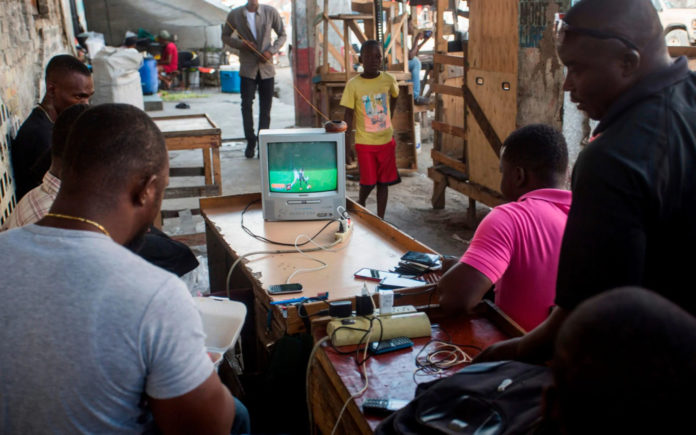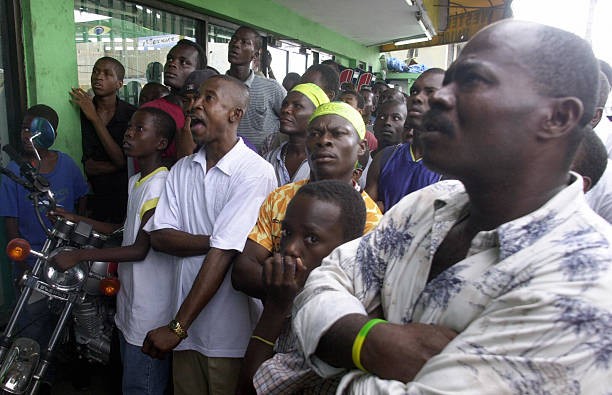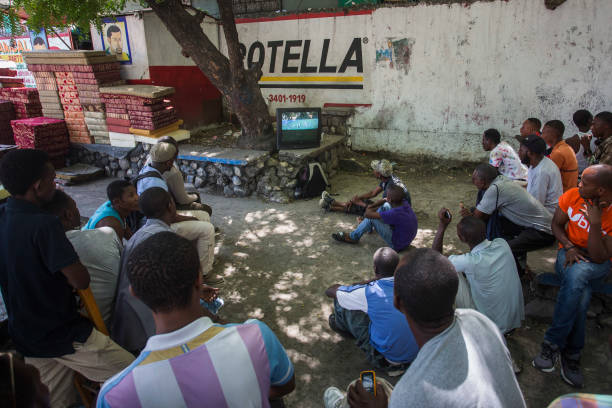
Did the cash-strapped Haitian government spend up to $14 million to buy 3000 flat-screen TVs for its parliamentary supporters? Why is there so much secrecy around this affair, which reeks of corruption?
Soccer’s World Cup in Russia this year is more than just a celebration of soccer for Haitians. Some took advantage of this period when all eyes are turned to Moscow, St. Petersburg, and other Russian cities hosting the games to distract the people in their own way with thinly veiled political messages announcing their candidacy for the next elections. Others used dictator François Duvalier’s mystical number of 22 (of June) to say on Voice of America radio that the year 2022 (when the next World Cup will be held) will be theirs, that is to say they will be in power in Haiti. If such declarations are likely to make most people smile or cry, there are some events that should move one to ponder our nation’s destiny and indeed the future of Haitians themselves. The most fundamental question is: Are Haitians living on another planet?
It has often been said that Haiti is unique, that in Haiti we do things like nowhere else. But this 2018 World Cup has brought events that force a Haitian to reflect. Can passion and fanaticism alone be responsible for the stupidity and ignorance of some of our compatriots? We are forced to call them that since, until proven otherwise, these people are indeed Haitians. Before we examine the squandering – that is the word – of taxpayers’ money on the purchase of thousands of plasma screen TVs for parliamentarians and others, let’s consider a video, that has been widely shared on social networks, showing a group of fanatics engaged in treasonous behavior without them even realizing that they were committing a very serious act against their country, nation and republic.
This video – which went viral, as they say, on the Internet – shows Haitian citizens hoisting Brazil’s flag while singing at the top of their lungs Haiti’s national anthem, La Dessalinienne. Many patriotically recoiled at this outrageous act occurring in the land of our founding father, the Emperor Jean-Jacques Dessalines. Obviously, these individuals are not traitors to the homeland, but clearly they have some educational shortcomings. Probably, these soccer fans didn’t know Brazil’s national anthem, so they sang the only hymn they did know: that of Haiti. This foolish display proves that there is only one thing that drives them: their love of the Brazilian soccer team. Thus, their anti-patriotic act is more or less forgivable.
In addition to this incident, there are several videos of huge demonstrations by fans of the Brazilian soccer team, surging through city streets in Haiti to celebrate that “their team” had just won a victory. Even the Brazilians of Rio de Janeiro or Brasilia have trouble understanding these demonstrations.
Worse still, some Haitian state officials shamelessly display Brazilian or Argentinian flags on the windshields or hoods of government vehicles with official plates to show their support of a team from a foreign state. The Haitian national soccer team has never had so many fans. And this has been going on for years! During each World Cup, it’s the same story. The Haitian media keep reminding people that police vehicles and other official cars are not allowed to display foreign flags on their hoods or windshields. Wasted effort! This 2018 World Cup broke its own record with the same ritual. Everywhere, in every street, the same show: Haitian state officials proudly riding with the colors of their favorite foreign team flying.

There is something that should concern a people and a state where even the police forces which are in charge of enforcing law and order do not respect anything in the face of their passion for Brazilian and Argentine soccer. Some used to say that Haiti is a country of mercenaries, that is to say, it is inhabited only by foreigners in transit to other destinations. Over the years, we have the impression that, even if not all are foreigners, a good number of people act like it.
This 2018 World Cup forces us to think about the mentality and political functioning of Haitians. When it is not the flags of Argentina or Brazil supplanting Haiti’s, it is the attitude and behavior of Haitian political leaders vis-à-vis this World Cup that makes us think we live in a country where everyone is crazy. In short, Haiti sometimes seems like a giant insane asylum.
During this period, almost everything stops working properly. Institutions in general and the state administration in particular have been dysfunctional since the World Cup began. Meanwhile in Russia, the host country, apart from the atmosphere created by thousands of fans and tourists from around the world, everything works fine, as if nothing in particular is happening. But when Haiti is watching the games on television, it’s the opposite. The country is literally closed. Haiti’s public administration turns into a place of entertainment around the televised matches, while lawmakers are nowhere to be seen. In Parliament, no plenary session has been held for a long time. All the attempts by Senate President Joseph Lambert and Chamber of Deputies President Garry Bodeau have been in vain. Futile calls follow one after another with the same result: no quorum is reached, so there is no session until the end of the World Cup. There was one half-hearted attempt to summon the Prime Minister for a vote of confidence, but even that did not take place.
A Haitian woman met during a conference last week told us either jokingly or bitterly: “Fortunately, Haiti did not qualify for the World Cup. Otherwise, the government would have sold the country to the Dominican Republic to allow all Haitians to travel to Russia.” This reflects this compatriot’s disdain for the huge investment made by the Haitian government for a World Cup that does not directly affect the country. Without a doubt, the Moïse/ Lafontant administration has broken all records compared to its predecessors, which have always made financial efforts, to a reasonable extent, to allow this global event does not go unnoticed, even if Haiti, since its last participation in 1974 in Germany, has never qualified. The government’s expenditure this year would not have been so shocking if at least the Grenadiers (the national soccer team) had qualified for the World Cup, but such was unfortunately not the case.
Institutions in general and the state administration in particular have been dysfunctional since the World Cup began.
But we also know that no serious effort was made to support their participation in the qualification phase. In fact, the Haitian state only agrees to help its nationals after the fact. It never intervenes upstream but always downstream. To facilitate the qualification or training of its national teams, it does not care. Everyone knows about the adventures of Haitian national soccer teams (both men’s and women’s) to participate in regional competitions. For lack of financial means, either they are eliminated or they simply cannot take part. And yet these young people carry the burning desire to win and have the potential to get to the top of their game and shine the national bicolor around the world.
Finally, one might convince oneself that Haiti’s budget does not allow its leaders to finance their teams’ preparation, that other investments, which are the government’s priority, are more urgent or important than sport or soccer in particular. Wrong! Despite an extremely limited budget, there has been a spate of expenditures for this World Cup from Moïse/Lafontant administration that can be described as insane or irresponsible.
To the extent that Haiti has nothing to gain or lose from the 2018 World Cup in the short, medium, and long term, it is an expense at a loss. First, there is a transaction for the right to retransmit the World Cup throughout Haiti. Unlike in previous years, when the Haitian media used to pirate the images from foreign television signals without permission to deliver them to the public with the added bonus of all kinds of strange advertisements, things are different now. Long before the matches started in Russia, the international soccer federation FIFA made new rules. No longer would the images of its World Cup saturate Haitian TV screens without any financial compensation from the government or a private company that had acquired the rights of retransmission for Haiti. Suddenly, a foreign firm entered the fray, just to ensure this mission for the State of Haiti.
A company called International Media Content, operating throughout Latin America and the Caribbean, has taken matters into its own hands. It set up a representative in Port-au-Prince to facilitate negotiations with private television channels or the government. But in Haiti, the bourgeoisie is very cautious and prefers to freeload off the state, so no private group came forward to negotiate with International Media Content to buy the rights to broadcast soccer’s 21st World Cup. As a result, and as usual, the government was stuck with the problem. After bitter negotiations through CONATEL (the National Telecommunications Commission), the two sides finally agreed that Haiti has the right to broadcast all World Cup matches. According to the Haitian Communications Ministry, the Haitian state has agreed to pay US$2.5 million so that all television channels, including the National Television of Haiti (TNH), have to negotiate this time with CONATEL to receive a decoder to be able to broadcast the matches live from Russia.
Thus, the Haitian government had to pay US$2.5 million in three installments, according to the International Media Content representative, so that Haitians can live their passion for soccer. On the other hand, we have learned that private television stations supposedly have an agreement with the government not only to broadcast public service announcements for the government but also to give the government 20% of the revenues from advertisements broadcast during the World Cup so that the government can defray its outlay.

In any case, even for a public treasury which is supposed to be almost empty, the government, in the case of soccer, will stop at nothing to satisfy, in the first place, the media lobbies which, it is true, might have to dig deep to buy the retransmission rights but profit handsomely from advertising during each match. On the other hand, one has to question the utility of Haiti’s business sector. How to explain that among Haiti’s big financial groups and commercial enterprises none sees the golden opportunity of acquiring the retransmission rights for the World Cup in Haiti?
Everyone knows very well that all private and public television channels would have to obtain the rights to broadcast the soccer games. The state cannot be everywhere and in everything especially when it is not obliged to intervene. Admittedly, investors might be afraid that local television channels would pirate broadcasts. But there is a public body, a sort of policeman of the airwaves, called CONATEL, which is responsible for enforcing the law and, especially with its technical means, capable of preventing audio and video broadcasting without authorization. Major private financial groups could have obtained World Cup retransmission rights without the state having to finance this activity, which is certainly recreational and entertaining, but in fact mainly commercial. Furthermore, most of the television channels belong to this sector of the bourgeoisie which owns all of Haiti’s private banks.
As an old friend told us, Haiti’s business sector has always considered itself to be selling rice and beans. So, they are unable to make real investments and especially do not wish to take any risks, even if they are confined to the sale of food products.
On the other hand, if to a certain extent one can understand this government expenditure (although it was by no means obligatory for the State given that Haiti is not competing), other money spent by the Moïse/ Lafontant administration raises serious questions. After investing US$ 2.5 million to buy the retransmission rights from which the State has nothing concrete to gain other than to increase the popularity of the President among the naive, there is another expense for which the government and Parliament will have the greatest difficulty in finding an explanation, or even a justification. This is the business of televisions for parliamentarians.
This is the biggest scandal in Haiti of this 2018 Soccer World Cup. First, although it was treated like a vital state secret, that the press became aware that all senators received from the executive branch at least 10 large-screen plasma TV sets, donated for the World Cup. At first, none of the beneficiaries wanted to confirm the news. With the media’s insistence and tenacity, some ended up confirming that “yes,” all the senators of the Republic did indeed receive from President Jovenel Moïse via the Prime Minister’s office and the Economy and Finance Ministry 10 flat screen TVs. Senate employees who are struggling to receive their pay will not forget the government’s attention to the senators. The employees are constantly being told that the public treasury is almost empty, hence the accumulating delays in paying their salary. But there was money for 290 costly, giant flat-screen televisions, that is ten televisions for each of the 29 senators.
This is the biggest scandal in Haiti of this 2018 Soccer World Cup.
In writing this column, it was useless questioning the people of the Senate or the government, impossible to get the total cost of these toys to the senators. According to Senate President Joseph Lambert’s entourage, these 290 televisions were to be distributed to remote populations in the countryside who supposedly have no way to watch the World Cup in Russia. And since there are two houses in Haiti’s Parliament – senators and deputies – the executive’s largesse could not be limited to the honorable senators. It had to also extend to the people’s deputies. But here the expenditure ballooned given the number of deputies. The Lower House’s presidency had to supply ten TVs to each of the 118 deputies, to which the executive added 8 televisions to government supporters and 5 to opposition deputies. So it came to a total of 18 TVs per pro-government deputy and 15 TVs for each opposition deputy.
In short, this 2018 World Cup 2018 will apparently have cost the Haitian Treasury more than 3,000 television sets just for parliamentarians and some government friends and supporters. The justification is that it allows the people of the back country to watch the World Cup like those of big cities where there are televisions everywhere. Framed like that, it appears to be a very nice gesture of solidarity with the rural masses.
Except, in this case, there is absolutely no transparency. Nobody has revealed the cost of each TV or the total cost of this boatload of deluxe electronics for elected officials and fanatics close to the President of the Republic. Neither the government nor Parliament wants to give figures. Each institution passes the ball to the other, simply saying that it is normal for the state to avoid discrimination and not penalize people in remote areas. Even the TVs’ brand, which certainly made a tidy profit, remains a mystery, as does the middleman, who likely overcharged. To our knowledge, there was no open bidding conducted by the public procurement agency on behalf of the state institutions involved. In addition, there has been and will be no control or monitoring to know whether or not these TVs have actually been distributed to people who need them. There is no obligation for parliamentarians to provide any report of what they did with the 10, 15, or 18 televisions that each received on behalf of their constituents. The whole affair stinks of corruption.
Despite the complete opacity surrounding the operation’s cost, according to some it cost the Treasury a king’s ransom of some US$14 million. Since favoritism is clearly at the heart of this affair, no proof was required of the senator, deputy or state representative proving that he actually donated to the rural population or hamlet these TVs which he received at the expense of taxpayers.
As every journalist and citizen is now trying to find out who paid for the TVs, how much they cost, and where they were bought, information is circulating on social networks saying that the TVs were a gift from the Taiwanese government to its Haitian counterpart. The Chinese rebel island’s embassy in Port-au-Prince supposedly confirmed the information. Whatever the case, whether paid for by Taiwan or the Haitian treasury, soccer’s 21st World Cup will have cost Haiti more than if the Haitian soccer team had been part of the matches in Russia. Unfortunately, the Grenadiers did not have this chance. President Jovenel Moïse and his head of government Jack Guy Lafontant had not seen the point of supporting them financially to give that outcome a chance.
Translated from French by Kim Ives.









